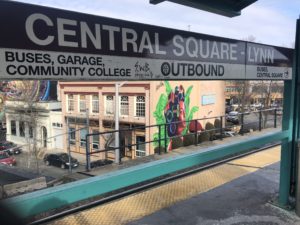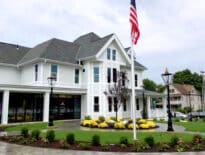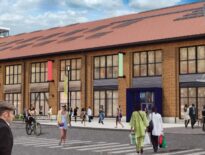
Development-friendly zoning, transit connections to North Station’s growing job cluster and Lynn’s rising public art profile laid the groundwork for one of the city’s largest developments since the Industrial Revolution. Photo by Steve Adams | Banker & Tradesman staff
Frustrated by a lack of public transit options, elected officials from Lynn pressed MBTA leaders Monday to offer more frequent commuter rail service through the city at the same price as core subway rides.
The city delegation has long pushed for better connectivity between Boston and the North Shore, lamenting the congested highways and tunnels many residents endure to get to work.
With other options such as a Blue Line extension remaining unavailable and the Department of Transportation concluding this summer that traffic is growing worse, city and state officials called Monday for a service upgrade on the existing commuter rail line as a viable short-term option.
The Greater Lynn area is one of the emerging hot spots in the region’s housing market and overall one of Greater Boston’s remaining pockets of affordability. Market-rate multifamily developers have also begun to move into the city to take advantage of its relatively quick commuter rail connection to North Station.
Lynn Mayor Thomas McGee said at a Fiscal and Management Control Board meeting that Lynn had been “abandoned” by transportation officials for decades.
“We as a region have been shortchanged for 50-plus years north of Revere,” McGee said. “Rapid transit has not come to the North Shore and we believe we need to look outside the box.”
McGee, who was joined by Sen. Brendan Crighton and Reps. Peter Capano and Daniel Cahill, said the MBTA should increase the frequency of trains on the Newburyport/Rockport Line that runs through Lynn and allow passengers to travel between the city and Boston – about 10 miles apart – for the same price as a subway ticket.
That setup is in place on most of the Fairmount Line, which travels through several lower-income and diverse Boston neighborhoods inaccessible by subway lines. Every stop on the line except for Readville, the endpoint, is categorized as Zone 1A, allowing passengers to pay the same for a one-way ticket as they would for a core rapid-transit trip.
Lynn, though, is a Zone 2 stop, which costs $7 each way. In a recent report, MassINC specifically highlighted the city as one area where commuter rail prices leave public transportation out of reach as an option for many residents.
“We could use that transportation option in Lynn,” Capano told the T’s board. “It would give us economic opportunity. Transportation can definitely help with that and reduce congestion on the way into Boston.”
The fiscal year 2020 budget lawmakers passed this summer requires MassDOT to study the feasibility of extending the Blue Line from its current terminus at Wonderland in Revere into Lynn.
Supporters of service improvements also want to see a ferry option from Lynn to Boston, but because the commuter rail is already running, they said expansions there could be the best option in the near future.
“We’re at a breaking point on the North Shore,” Crighton told the News Service outside the meeting. “While we continue to push for water transportation as well as a Blue Line connection, we think it’s important to try to get our name out there in terms of something similar to what the Fairmount Line is doing with the Indigo Line.”






